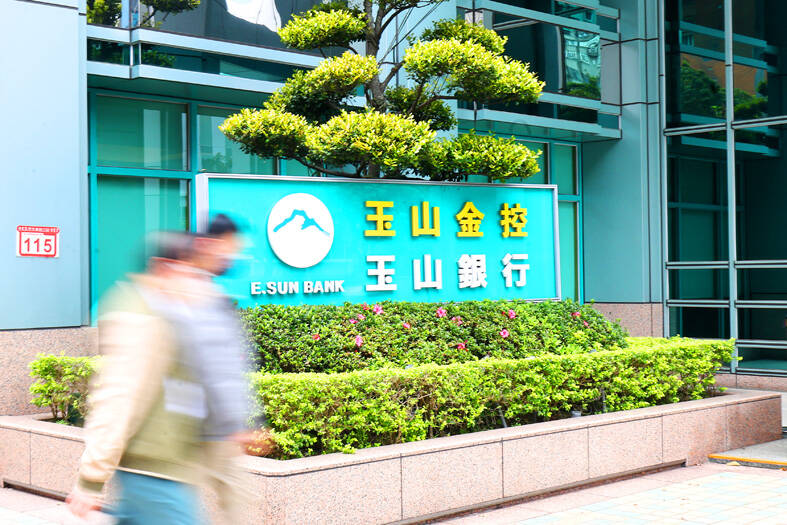E.Sun Financial Holding Co (玉山金控) is to acquire a more than 90 percent stake in US-based Prudential Financial Inc’s subsidiary in Taiwan to grow its wealth management business.
The company’s board of directors approved a plan to acquire a 91.2 percent stake in PGIM Securities Investment Trust Enterprise Co (保德信投信) for about NT$2.76 billion (US$83.53 million), E.Sun Financial president Chen Mao-chin (陳茂欽) said at a news conference on Tuesday night.
E.Sun Financial and Prudential Financial signed a memorandum of understanding in November last year that paved the way for the acquisition, Chen said.

Photo: CNA
The acquisition comes at a time when the government has set its sights on transforming Taiwan into a regional wealth management hub.
E.Sun Financial in 2008 disposed of its investment trust assets, but the company earlier this year decided to rebuild its presence in the field by acquiring PGIM, Chen said.
The move should also help E.Sun Financial better integrate its existing banking and securities businesses to create synergies and sharpen the company’s competitive edge, he said.
With the sale of its unit, Prudential Financial would withdraw from the Taiwanese market, local news media reported.
The deal with E.Sun Financial comes after Prudential Financial sold its insurance assets to Taishin Financial Holding Co (台新金控) in 2020.
PGIM, which has assets under management totaling about NT$160.8 billion, specializes in raising funds for mutual funds and serves as a sale agent in Taiwan for foreign-issued mutual funds.
E.Sun Financial would acquire the Prudential unit with cash, which would come from the company’s existing cash reserves or sales of short-term commercial paper, Chen said.
The acquisition is unlikely to affect the company’s future dividend payouts to its shareholders, he said.
E.Sun Financial would file an application with the Financial Supervisory Commission for regulatory approval as soon as possible, he added.

KEEPING UP: The acquisition of a cleanroom in Taiwan would enable Micron to increase production in a market where demand continues to outpace supply, a Micron official said Micron Technology Inc has signed a letter of intent to buy a fabrication site in Taiwan from Powerchip Semiconductor Manufacturing Corp (力積電) for US$1.8 billion to expand its production of memory chips. Micron would take control of the P5 site in Miaoli County’s Tongluo Township (銅鑼) and plans to ramp up DRAM production in phases after the transaction closes in the second quarter, the company said in a statement on Saturday. The acquisition includes an existing 12 inch fab cleanroom of 27,871m2 and would further position Micron to address growing global demand for memory solutions, the company said. Micron expects the transaction to

Vincent Wei led fellow Singaporean farmers around an empty Malaysian plot, laying out plans for a greenhouse and rows of leafy vegetables. What he pitched was not just space for crops, but a lifeline for growers struggling to make ends meet in a city-state with high prices and little vacant land. The future agriculture hub is part of a joint special economic zone launched last year by the two neighbors, expected to cost US$123 million and produce 10,000 tonnes of fresh produce annually. It is attracting Singaporean farmers with promises of cheaper land, labor and energy just over the border.

US actor Matthew McConaughey has filed recordings of his image and voice with US patent authorities to protect them from unauthorized usage by artificial intelligence (AI) platforms, a representative said earlier this week. Several video clips and audio recordings were registered by the commercial arm of the Just Keep Livin’ Foundation, a non-profit created by the Oscar-winning actor and his wife, Camila, according to the US Patent and Trademark Office database. Many artists are increasingly concerned about the uncontrolled use of their image via generative AI since the rollout of ChatGPT and other AI-powered tools. Several US states have adopted

A proposed billionaires’ tax in California has ignited a political uproar in Silicon Valley, with tech titans threatening to leave the state while California Governor Gavin Newsom of the Democratic Party maneuvers to defeat a levy that he fears would lead to an exodus of wealth. A technology mecca, California has more billionaires than any other US state — a few hundred, by some estimates. About half its personal income tax revenue, a financial backbone in the nearly US$350 billion budget, comes from the top 1 percent of earners. A large healthcare union is attempting to place a proposal before